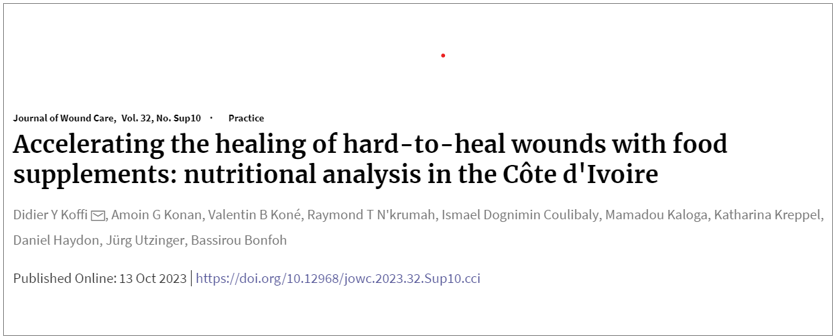
MALNUTRITION: Healing wounds using nutritional supplements

A recent study conducted in the south-central region of Côte d'Ivoire has revealed that nutritional supplements, such as soy and sweet potatoes, could be a potential solution for challenging wounds, which is a pressing issue often overlooked in low- and middle-income countries.
The study, published on the Journal of Wound Care on October 13, 2023, aimed to explore the benefits of using nutritional supplements as a treatment remedy, particularly in situations where malnutrition prolongs the healing process.
Ifakara, partners initiate the study
Led by a team of scientists from academic and research institutions in Côte d'Ivoire, in collaboration with partner institutions from the United Kingdom (University of Glasgow), Switzerland (Swiss TPH and University of Basel), and Tanzania (Ifakara Health Institute), the study was initiated to address the effect of malnutrition in delayed wound healing.
“Malnutrition has been identified as a risk factor for prolonged healing times. However, nutritional supplements are not routinely provided for patients with hard-to-heal wounds, and so this study aimed to investigate their benefits,” wrote the scientists.
56 patients recruited, treated
The study, spanning over a period of nine months and carried out in the Taabo Health and Demographic Surveillance System in the south-central part of Côte d'Ivoire, involved 56 patients with wounds, with 72% of them being treated as inpatients and 28% as outpatients.
The patients were categorized into four groups, with some receiving soy supplements, others receiving orange flesh sweet potato (OFSP) supplements, a third group receiving a combination of both, and a control group receiving no supplementation.
The scientists then used general linear models to analyze how various factors, such as initial wound size, wound type, food treatment group, hemoglobin levels, gender, age, treatment location, and body mass index, influenced the rate of wound closure.
Supplements linked to wound healing
Notably, the use of orange flesh sweet potato (OFSP) supplements, known for their high beta-carotene and carbohydrate content, was linked to quicker healing, reduced discomfort, and reduced cost of wound care.
According to scientists, the study's results indicate that a diet rich in beta-carotene, particularly when combined with standard medical care, holds promise in accelerating the healing process for difficult-to-treat wounds. However, they have emphasized the need for further studies to explore the full potential of nutritional supplementation in addressing this public health challenge in LMICs.
Contributors of the study
The study was led by Didier Koffi and Amoin Konan from Félix Houphouët Boigny University (UFHB) along with Bassirou Bonfoh from The Swiss Center for Scientific Research in Côte d'Ivoire (CSRS) – all from Côte d'Ivoire.
Additional contributors to the study include Valentin Koné, Raymond N'krumah and Ismael Dognimin Coulibal – also from CSRS. Others include Mamadou Kaloga from Programme National de Lutte contre l'Ulcère de Buruli in Côte d'Ivoire, Katharina Kreppel who was affiliated to the Ifakara Health Institute, Tanzania, Daniel Haydon form the University of Glasgow, UK and Jürg Utzinger from Swiss TPH, Switzerland.
Read the full publication here
